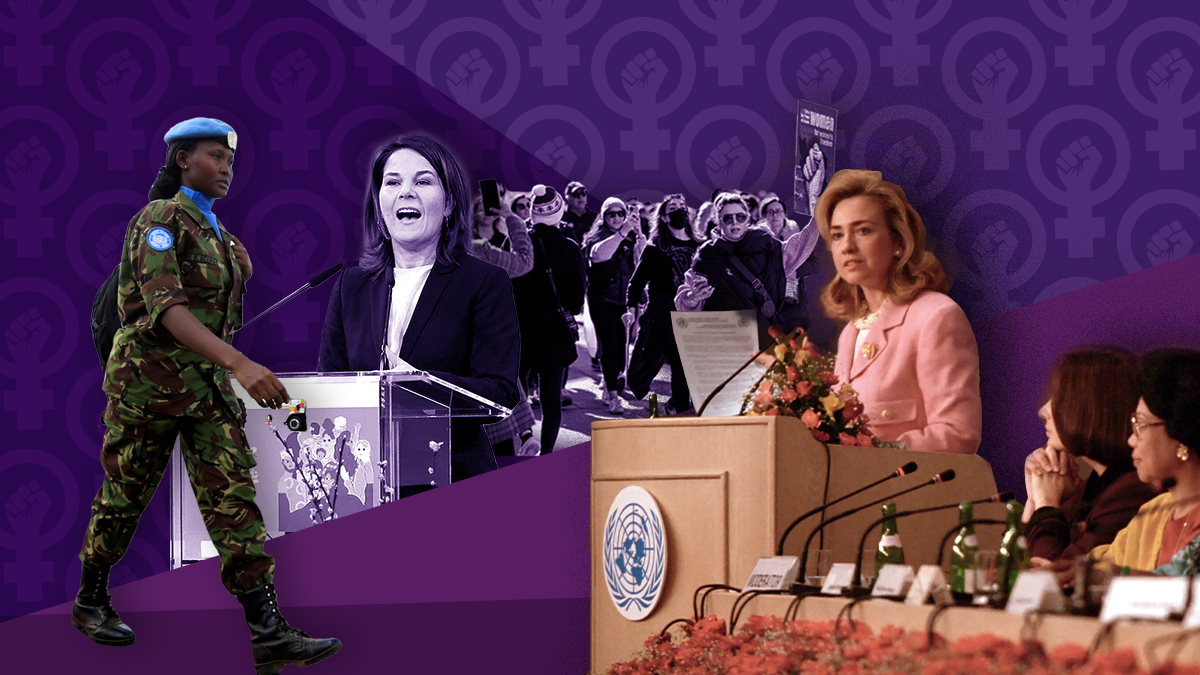Alles liebe zum Frauentag! To mark International Women's Day we delve into feminist foreign policy. Which countries have adopted the gender-focused framework that shapes how they interact with other states, and how does the policy play out in practice?
Germany made headlines this week when Foreign Minister Annalena Baerbock unveiled a new feminist foreign policy framework, outlining Berlin's efforts to boost female participation in international affairs. It directs an additional 12 billion euros in development funds to further global gender equality and says that Berlin will work to ensure that European foreign policy focuses more on the needs of women worldwide.
But what is a feminist foreign policy, and what do proponents and critics of the framework have to say about it?
First, some background. In 1995, then-first lady Hillary Clinton declared in Beijing that “women’s rights are human rights,” publicly advocating that gender equality be a core principle in international politics.
Since then, a growing number of political influencers have pushed for a radical overhaul of how states interact with each other, arguing that the pursuit of gender equality should be at the heart of all international politics.
While there is no uniform approach to its implementation – countries have interpreted the framework differently – there are areas of overlap, including the idea that increasing the number of women working in foreign policy reduces conflict and enhances peaceful outcomes. A look at the impact of having women negotiators, mediators, and witnesses involved in 182 peace agreements from 1989-2011, for example, shows that those deals involving females were 35% more likely to survive at least 15 years, according to a report by the International Peace Institute.
There’s broad agreement that gender equality at home, including increased female participation in the workforce, at the negotiating table, and in policy-making, boosts security at home and abroad. As a result, there's been an uptick in female participation in legislatures around the globe in many countries, while some institutions have introduced gender quotas in politics. The European Union, for instance, started calling for a minimum of 50% women in all its decision-making positions back in 2020 – and a whopping 85% of women in decisions about development aid.
The Wallström effect. Sweden was the first country to adopt a feminist foreign policy in 2014, when former Foreign Minister Margot Wallström, a no-nonsense stalwart of the left-wing Social Democratic Party, argued that gender issues should govern how Stockholm doles out aid and conducts trade negotiations. While Wallström’s plan was initially met with skepticism, including amongst the diplomatic corps, she also applied this approach to the private sector, pushing for gender quotas on company boards.
Crucially, for Sweden, adopting the term feminist was not only an ideological play but also a strategic one: A 2020 report by PwC found that if the female employment rate across OECD states matched Sweden’s, the group’s collective gross domestic product could be boosted by $6 trillion.
The trend has since caught on, with comparable policies adopted by Canada, Mexico, Spain, Luxembourg, Chile and France. Mexico has mandated that an equal number of men and women work within the foreign ministry, for example, and pushed for “gender equality in all policies to combat climate change” in international forums.
Meanwhile, under former Foreign Minister Chrystia Freeland, Canada in 2017 committed to directing 95% of its foreign aid budget over five years toward programs in which gender equality was the primary or significant objective (the latter caveat, however, has been criticized for vagueness).
How do these policies play out in practice? Like with many lofty foreign policy objectives, it’s hard to measure what constitutes success. For instance, how much of Sweden’s economic growth over the past decade can be attributed to this gender-first policy as opposed to external economic factors? (Crucially, Sweden’s new center-right government ditched the policy in Dec. 2022, saying that “labels on things have a tendency to cover up the content.”)
What’s more, critics argue that feminist foreign policies can be preachy and abstract. Berlin, for its part, says that it will be more “gender sensitive” in doling out money and that it will cultivate a “feminist reflex” within the foreign ministry – neither of which are particularly measurable. Many have also accused Mexico of extreme inconsistencies, arguing that it has done little to address rampant gender-based violence and femicide at home.
Even the most gung-ho proponents of feminist foreign policy acknowledge that it can be an abstract concept that’s difficult to implement. “Many countries use it as a virtue-signaling branding exercise,” says Marissa Conway, CEO of the United Nations Association in the UK and feminist foreign policy expert.
When I asked Conway about Germany’s approach, she hesitated. “In some ways it’s impressive, but it is also very aspirational,” she says, adding that “it strikes me as very hollow,” referring to the fact that Berlin has voiced support for militarism which is at odds with traditional feminism.
But how then do proponents of the approach reconcile this non-militaristic stance with the need to help democracies – like Ukraine – protect themselves from authoritarianism? “Feminist foreign policy is not some magic wand that we can wave over everything and it will make conflicts and wars stop,” Conway says.
Instead, “it is a path to a very long-term goal in shaping how states interact with each other.”
